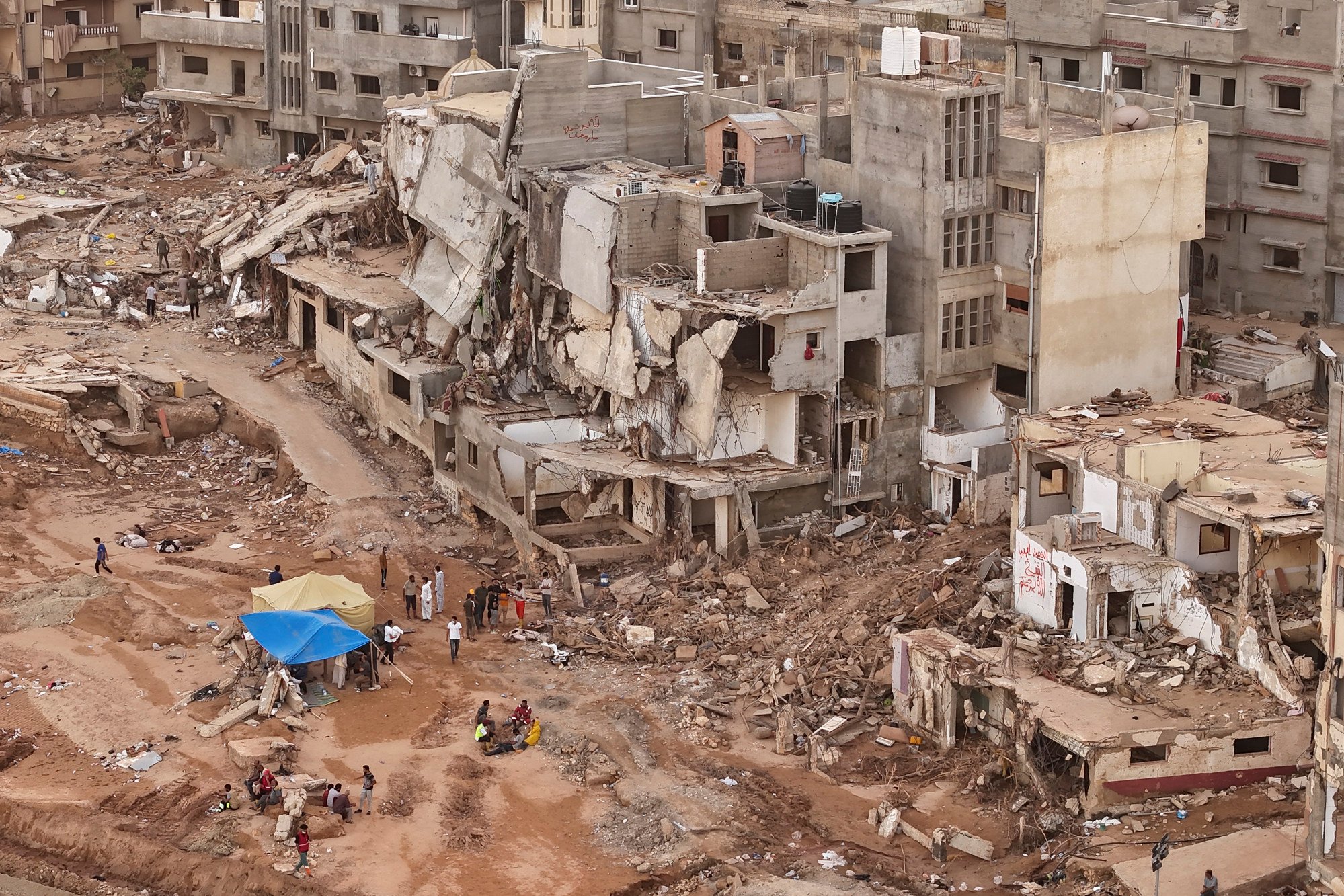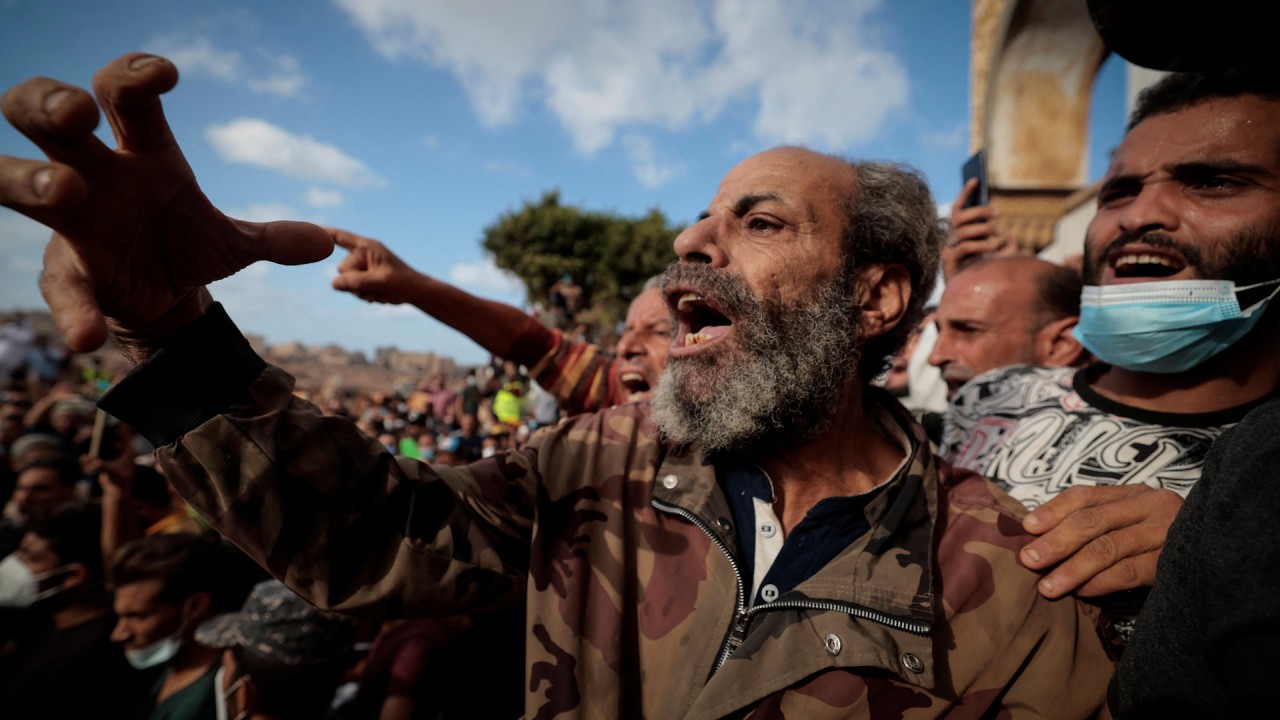
Libya floods: journalists ordered out of Derna after protests
- Reporters were asked to leave hours after demonstrators torched the ousted mayor’s home over the authorities’ failure to protect the city
- Number of journalists impedes rescue teams, a minister said, while new research said deluge very rare but worsened by poor maintenance
Journalists were ordered out of the devastated eastern Libyan city of Derna on Tuesday, the morning after demonstrators staged a rally and torched the home of the ousted mayor in fury over the authorities’ failure to protect the city from floods.
Arab broadcaster Al Hurra reported that the authorities had asked all journalists to depart as soon as possible. An Al Jazeera correspondent reporting from the city said he had been told to leave.
Hichem Abu Chkiouat, minister of civil aviation in the administration that runs eastern Libya, told Reuters by phone that the decision to move journalists was unrelated to the protests there overnight.
“It is an attempt to create better conditions for the rescue teams to carry out the work more smoothly and effectively,” he said. “The large number of journalists has become an impediment to the work of rescue teams.”
He later said that reporters were not being told to leave Derna altogether, only to leave areas where their presence might hinder rescue operations.
Monday’s mass demonstration was the first reported in the city since it was hit by the worst natural disaster in Libya’s history a week earlier.
Communications links to the city, which had functioned despite the flood, were shut down on Tuesday morning.
Thousands of people have been confirmed killed and thousands more are still missing from the September 10 flood, when two dams burst above Derna in a storm, unleashing a torrent of water that swept away the centre of the city.
On Monday demonstrators crowded into the square in front of Derna’s landmark gold-domed Sahaba mosque chanting slogans. Some waved flags from atop the mosque’s roof. Later in the evening, they torched the house of Mayor Abdulmenam al-Ghaithi, his office manager told Reuters.

The government administering eastern Libya said Ghaithi had been suspended as mayor and all members of the Derna city council had been dismissed from their posts and referred to investigators.
A week after the disaster, swathes of Derna remain a muddy ruin, roamed by stray dogs, with families still searching for missing bodies in the rubble.
Angry residents say the disaster could have been prevented. Officials acknowledge that a contract to repair the dams after 2007 was never completed, blaming insecurity in the area.
Libya has been a failed state for more than a decade, with no government exercising nationwide authority since Muammar Gaddafi was toppled in 2011.
Derna has been controlled since 2019 by the Libyan National Army which holds sway in the east. For several years before that it was in the hands of militant groups, including local branches of Islamic State and al-Qaeda.
UN warns of concerning situation at 2 more Libyan dams
The demonstrators denounced the eastern-based parliament speaker Aguila Saleh, who has called the flood a natural catastrophe that could not be avoided.
“Aguila, we don’t want you! All Libyans are brothers!” protesters chanted.
Mansour, a student taking part in the protest, said he wanted an urgent investigation into the collapse of the dams, which “made us lose thousands of our beloved people”.
Taha Miftah, 39, said the protest was a message that “the governments have failed to manage the crisis”, and that the parliament was especially to blame.
The full scale of the death toll has yet to emerge, with thousands of people still missing. Officials have given widely varying death tolls. The World Health Organization has confirmed 3,922 deaths.
Fears grow flood death toll could hit 20,000 in Libyan city of Derna
Meanwhile, new research on Tuesday said climate change made torrential rains that triggered the deadly flooding up to 50 times more likely and noted that conflict and poor dam maintenance turned extreme weather into a humanitarian disaster.
Scientists from the World Weather Attribution group said a deluge of the magnitude seen in Libya was an event that occurred once every 300-600 years.
They found that the rains were both more likely and heavier as a result of human-caused global warming, with up to 50 per cent more rain during the period.
In a report looking at floods linked to Storm Daniel that swept across large parts of the Mediterranean in early September, they found that climate change made the heavy rainfall up to 10 times more likely in Greece, Bulgaria and Turkey, and up to 50 times more likely in Libya.
Additional reporting by Agence France-Presse


